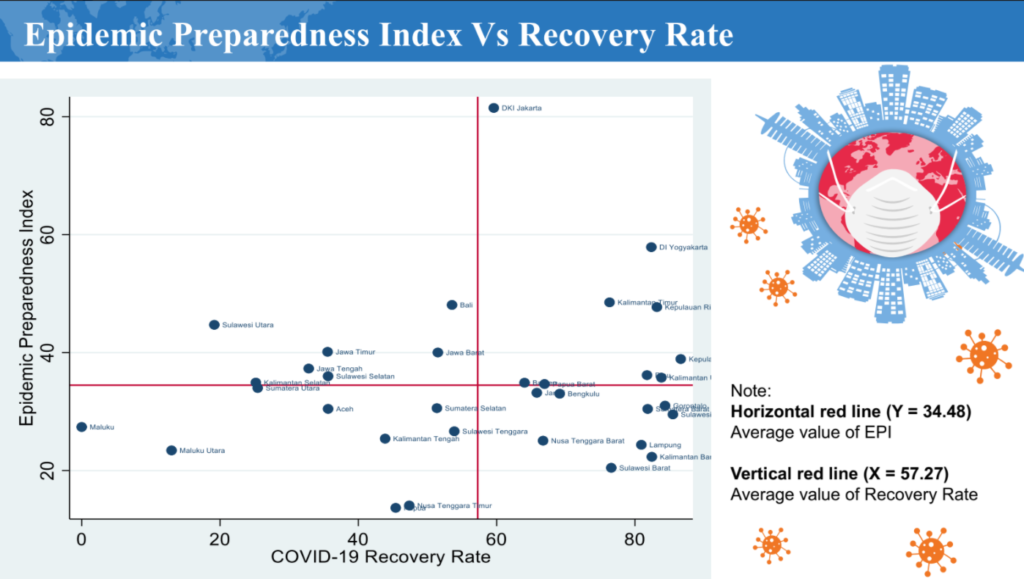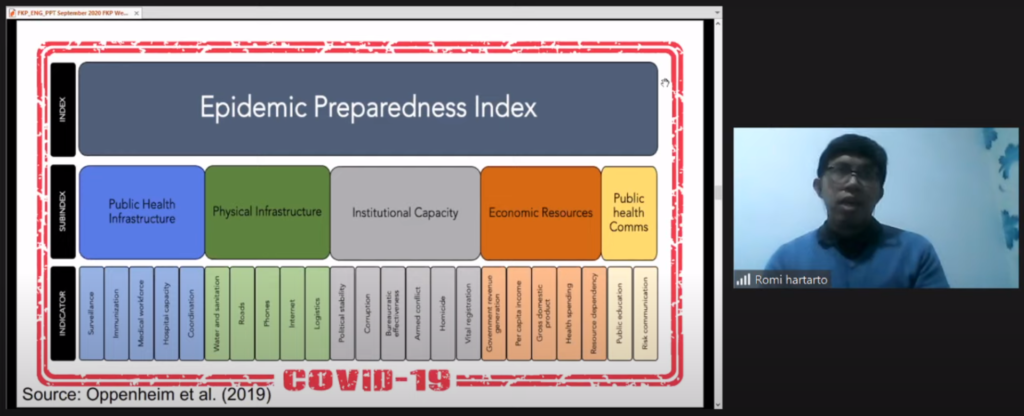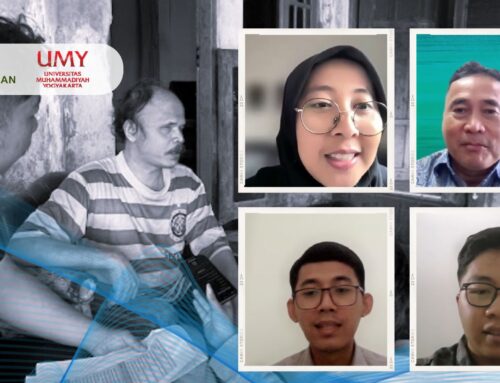FKP hosted by ANU Indonesia Project with Rachmat Ari Wibowo (Universitas Gajah Mada) and Romi Bhakti Hartarto (Universitas Muhammadiyah Yogyakarta). Selasa, 29 September 2020.
KEY POINTS:
- The COVID-19 pandemic has become a serious threat to many countries, including Indonesia. Based on the Epidemic Preparedness Index (EPI) constructed for Indonesia the study found that a higher preparedness index does not necessarily translate into higher recovery rate.
- Many factors that inhibit and facilitate the community in implementing government recommendations on face mask usage, physical distancing, and mobility restriction. Survey respondents report being “hard to breathe” and having “forgotten” as the main barriers from wearing a mask. In terms of physical distancing, fear facilitated people to comply, while feeling awkward is one of the top barriers to comply. In the case of mobility restriction, the barriers were feeling of missing someone and job opportunities.
SUMMARY
- The COVID-19 pandemic has become a serious threat to many countries, including Indonesia. This research aims to investigate the health facility preparedness and to analyze the community behavior in four selected provinces in Indonesia (East Java, Central Java, Jakarta and West Java) during COVID-19 pandemic. Using the research framework of the Epidemiological Triad of Causal Factors by Frost (1976), the study tries to capture the relationship between Agent (coronavirus), Environment (healthcare facility preparedness) and Host (community behavior).
- To investigate the health facility preparedness in Indonesia, an Epidemic Preparedness Index (EPI) based on Oppenheim et al. (2019) is constructed. EPI is an index which accounts for health infrastructure, institutional capacity, economic resources, and public health communications. The graph below shows the relationship between EPI and COVID-19 recovery rate for each province in Indonesia. Note, however, that higher preparedness index does not necessarily translate into a higher recovery rate. Jakarta, for example, has a relatively high preparedness index but only slightly higher recovery rate than the national average.

- To analyze the community behavior in Indonesia, the analysis was carried out using the COM-B (Capability, Opportunity, and Motivation Behavior) model, which focused on changes in people’s behavior during the pandemic, by applying ‘Behavior Change Wheel’ theory. The behavior change wheel identifies factors that inhibit (barriers) and facilitate (facilitators) the community in implementing government recommendations (mobility restriction, physical distancing, and face mask usage). The study found that motivation was the most frequently mentioned facilitator in implementing government’s recommendations
- In the case of mobility restriction, the feeling of missing someone and job opportunities were the most frequently mentioned barriers to comply. For physical distancing, fear facilitated people to comply, while feeling awkward is one of the top barriers to comply. For wearing face masks, hard to breathe and forgetfulness were the main barriers to comply, while fear was the facilitator to comply. Also, people have false sense of security caused by herbal medicine for COVID-19 and disinfectant chamber misinformation. Although these unrealistic optimism could give positive effects on mental health and life satisfaction, unfortunately it could lead to non-compliance to evidence-based preventive behaviors as recommended by the protocols. Almost 20% of respondents believe they will not get infected by COVID-19, probably due to excessive misinformation that people get from social media. Therefore, the researchers suggest that it is important to work together to change community behaviors through increasing public awareness.





